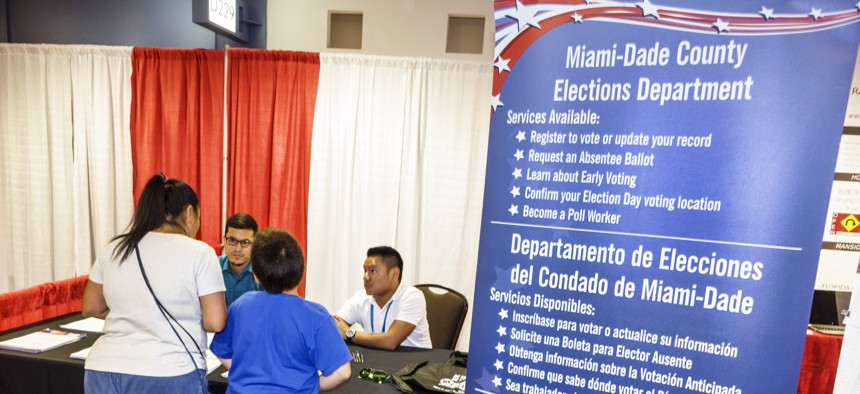Ask the Experts: How did the GOP get the voter registration edge in Florida?
We asked how the Republican Party finally overtook the Democrats in the number of voter registrations in the Sunshine State.

In this undated photo, staff of the Miami-Dade County Elections Department help register voters at the International Auto Show at the Miami Beach Convention Center. Jeffrey Greenberg/Universal Images Group via Getty Images
Republican majorities captured Florida’s Senate and House in the 1990s and cemented their trifecta control over state government with Jeb Bush’s win in the 1998 governor’s race. But it took nearly a quarter of a century for voter registration numbers to catch up. There had always been more registered Democrats than Republicans in Florida until late last year, when Gov. Ron DeSantis announced that Republicans had flipped the voter rolls red. “It’ll probably be fully publicized very soon, but today for the first time in the history of Florida we’ve now overtaken Democrats," DeSantis said, in a speech at a National Conference of State Legislatures event reported by the Sarasota Herald-Tribune.
At the time, he was basing his claim on internal Republican Party of Florida statistics. As of May 31, according to the state’s Division of Elections, there were 5,135,749 active registered Republicans and 4,959,838 Democrats, for a difference of almost 176,000. And it’s important to note that the number of independent, or “no party affiliated” – or NPA – voters also has grown, to 3,865,575 at last tally.
What’s driving the GOP’s uptick? City & State consulted with three Florida politics experts: Darryl Paulson, emeritus professor of government at the University of South Florida St. Petersburg and a lifelong Republican who left the party after Donald Trump won the GOP presidential nomination in 2016; Charles Zelden, a professor of history and political science at Nova Southeastern University in Broward County; and Aubrey Jewett, assistant director of the School of Politics, Security and International Affairs at the University of Central Florida in Orlando. Their responses have been edited for clarity and brevity.
Why did it take so long for the voter registration numbers to catch up to the Republican political control of the state, at least at the state level?
Darryl Paulson: It was a top-down process, so to speak. Republicans started winning presidential races, especially in Florida. I mean, Florida was the first Southern state to go Republican on a regular basis, and it continued that for the next half century and continues pretty much today. And then it filtered down to the congressional races, to the state legislative races, and finally to local races. But many of the people who were registered as Democrats for so long voted Republican. They started voting Republican in the presidential elections and that filtered down, but for many of them, they couldn't bring themselves to pull the trigger, go down to the voter registration office and change their party from Democrat to Republican. So you still find in the panhandle area of north Florida, for example, areas which are substantially Democrat in voter registration, but you look at the voting patterns and they’re overwhelmingly Republican.
Charles Zelden: Much of the movement of new people to Florida is coming to the exurban areas of Florida. They're coming to areas that are red to begin with. It used to be 20 years ago that most of the flow came into south Florida, Orlando, Tampa. Now they're coming to the rest of the state, from The Villages to the west and southwest coast of Florida. And the new voters that are coming in are already Republican voters. It doesn't help that the Democrats also don't have much of a bench. There’s no leader to enthrall the base, there’s no Democratic DeSantis.
Aubrey Jewett: If you look at voter registration trends in Florida over the real long run, over many decades, Republicans actually have been gaining ground for some time, really starting in the 70s and going into the 80s, the Reagan years, into the 1990s. Republicans were gaining slowly but surely, and at a certain point it leveled off and they never quite took the lead. And it got within two or three percentage points. When Barack Obama emerged on the national political scene, for a few years, the trend started to actually reverse. By the time Obama won Florida the first time back in 2008, Democrats had actually stretched their lead back out to about six percentage points over Republicans.
How much does the organizing strength of each party play into the switch, rather than people’s politics?
Jewett: For sure, I think the Republicans have done a good job, particularly this last election, of painting Democrats as socialist, too liberal for Florida, wanting to raise your taxes, and so on. But historically, Republicans have always been better organized than Democrats. I tell my students, historically Republicans were in the minority. If you go back to the 1950s or ‘60s in Florida, less than 5 or 10% of the whole population might be registered Republican. Since then, Republicans got organized, raised money and did voter mobilization, registration drives and that sort of thing. Florida Democrats have not done as well. Even with Barack Obama, there were a lot of articles written about how he basically brought in his own team and didn't rely on the Florida Democratic Party. You know, they basically came in and did their own thing.
Paulson: It's been a dismal last few years in particular for the Democrats. After the Democratic candidate for governor, Andrew Gillum, lost, he had all of this money he didn't spend left over in his coffers. Then he started this voter registration drive that was his primary occupation after he lost the governor's race to make sure that Democrats regained or increased their numbers throughout the state of Florida. And that was a dismal failure. Perhaps it tells you he probably wouldn't have been a very effective governor because his voter registration efforts never materialized.
What lessons are there for either party as to the rise of NPAs?
Jewett: A lot of surveys have shown that a fairly large percentage of those voters are under 40. They're not enthused with either of the major parties. They like some things about one, some things about the other, but they really are not crazy about the two main parties that we have. And so that's driven the trend as well. A lot of younger voters are just dissatisfied, and so that has helped increase the number of NPAs as well.
Zelden: There are a lot of people in Florida who are unwilling to make a commitment to one party or the other to self identify as a Democrat or as a Republican. So they want to vote, many of them do in fact vote. And many of them vote for the same party, but they're not willing to stand up and say, I am a Democrat or I am a Republican. It's a question of commitment, but it also makes these voters easier to shift than people who self-identify with a party. Now, does that make them swing voters? Not necessarily, because most of them end up voting for the same party year after year. But if there is a swing happening, they're the ones who will be swinging.
